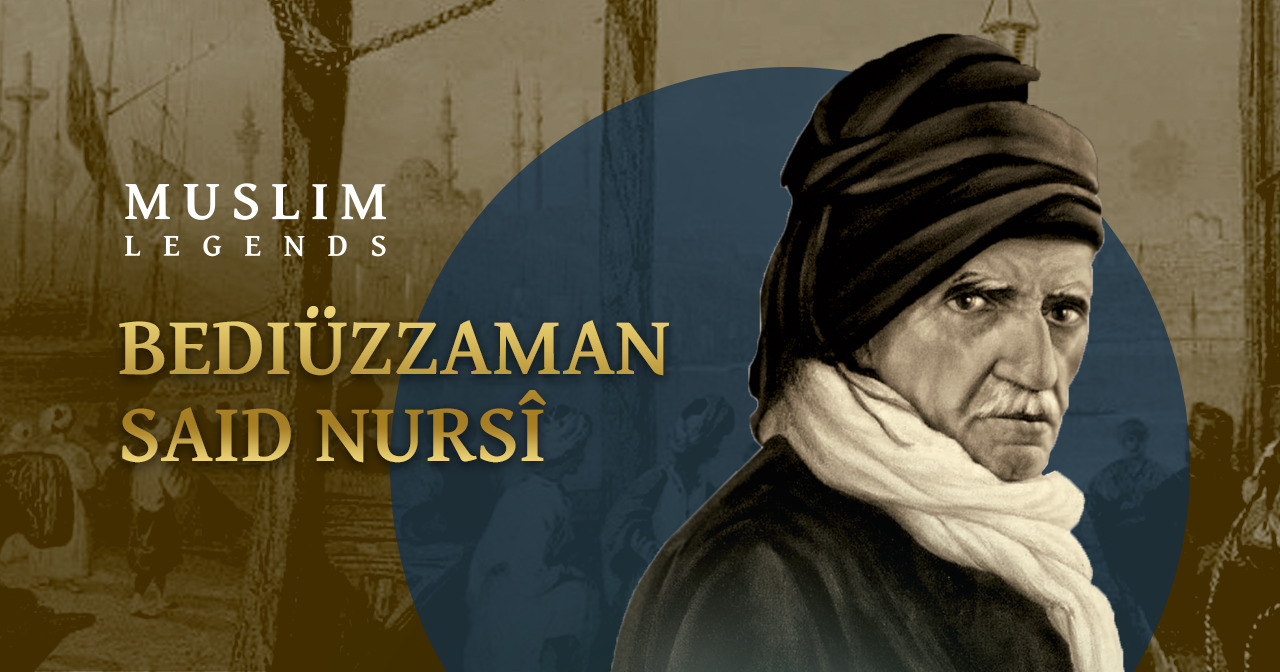‘They requested decision [i.e. victory from Allāh], and every obstinate tyrant was [therefore] disappointed.’[1]
It is always an important question to ask why we should celebrate the legacy of a certain man, as there have been many great men in this Ummah. However, Allāh sometimes uses men as instruments for great things, and these men become reflections of the illustrious values of the Qur’ān.
Bediuzzaman Said Nursi is undoubtedly one of these men. His life is one of tireless, peaceful, scholarly, spiritual, and societal efforts to preserve the īmān of the people. Under the tutelage of the most infamously brutal secular military regime in the world, Said Nursi was at the forefront of resistance in defending the Qur’ān. Unlike some Sufis who wanted to retreat into their khanqah, and unlike some writers who were totally divorced from the needs of the people and only furthered the elitist academisation of important religious issues, Said Nursi was deeply in touch with the role of the scholar in the modern era. In light of this, Said Nursi and his humble students gave their lives to plant a seed from which Turkey still enjoys the fruits; the seed of a true Islamic revival.
Said Nursi was born in 1877/8 in the village of Nurs. He was of Kurdish descent and was a keen student, attending the classes of Mullah Mehmet Emin Efendi and the Sheikh of Hizan. Said Nursi’s peers and teachers were always astonished by his eagerness to learn and ability to read and memorise seminal Islamic texts like those of al-Suyūti. He was also well versed in Arabic literature, including the famed works of al-Harīri of Basra. This would prove important to his later life, as he would spend much of it in exile whilst the Kemalist authorities sought to rid the Turkish people of the ability to read Islamic texts (primarily the Qur’ān) by changing the alphabet. In this sense, we are reminded of the importance in our lives of memorising the Qur’ān and other Islamic precepts, for one who lives with knowledge in his chest is not like one who is reliant on words written on paper.
The period in which Said Nursi embarked on his journey to study Islam was one of great volatility. The Ottoman Caliphate was under constant military and ideological attack from both secularists and Orientalists in Europe. Considering this, Said Nursi sought to understand ‘modern sciences’ and prove their compatibility with the traditional Islamic sciences, such that the modern era would not necessarily be the secular era. Likewise, he was keen to insist that true liberty was not found in the dominating French system of the time, but rather in the Sharī’ah. This was a calling he proclaimed in 1909 after the coup on Sultan Abdul Hamid II (rahimahu Allāh).
Said Nursi identified and analysed the many sources of this confusion surrounding Islam, such as the secular domination of media, the exploitative tactics of establishment political parties, and the militarisation of the political process. Hopeful about the future, Said Nursi keenly noted that, culturally speaking, the Ottomans were pregnant with Europe and would soon give birth to it, but that, conversely, Europe was pregnant with Islam and would give birth to it too. We still wait for this great prediction for which we all must strive with our wealth and lives.
The early years of the Ustādh were certainly formulative. He was exposed to the most pervasive forces of what was wrongly called ‘modernity’, but which was merely veiled secularisation. He was therefore keen to travel across Turkey to pursue his studies. He even went to Damascus, where he gave his famous ‘Damascus Sermon’ to some 10,000 people in 1911. In it, he identified the roots of the weakness in the Muslim Ummah and what was needed to ensure a civilisational revival.
As much as he was a man of knowledge, Said Nursi was also a man of great fortitude and principle. He enlisted in the Ottoman army during the First World War and sought to protect the lives of Armenian children. An Armenian militia leader stated he would stop the killing of Muslim children due to Said Nursi’s magnanimity.[2] Said Nursi was eventually captured and imprisoned in a Russian war camp, where he would demonstrate his bravery by paying little regard to the Russian general and praying before being put in front of the firing squad. Shocked by Said Nursi’s show of little concern about death, his Russian captors recognised him as a man who feared God alone and thus lifted his death sentence. He remained in the prison camp and used it as a place to teach Islam. This would become a motif of his life: wherever he resided, whether it was a prison camp, isolated village, or prison cell, it would become a madrasah.
After the First World War, the Ottoman Caliphate quickly lost all power, and by 1924, the position of Sultan in the country was abolished. This remains one of the darkest days in the entirety of the history of the Ummah. Never before has the Ummah lost the institution of the Caliphate, which has acted to bring uniformity to the affairs of the Muslims and manifest the internationalism of Islam. Some reacted violently to this defilement of the sacred institutions of Islam. In 1925, Sheikh Said of Palu led a rebellion in the city of Diyarbakır against the secular leader Mustafa Kemal Atatürk. Said Nursi refused to join this rebellion due to his fear of causing bloodshed and discord, still believing that the new authorities would not totally disregard Islam. Seeing this, Atatürk tried to co-opt the ulema by attempting to hire Said Nursi as a deputy in the Grand National Assembly and as Minister of Religious Affairs. After his meeting with the regime, Said Nursi realised they had no interest in progressing the cause of Islam and instead wanted to control the scholars of Islam and force them to release fatāwa to legitimise their incoming reforms regarding alcohol legalisation and the Europeanisation of the dress code. Nursi adamantly rejected all of this, and as a result was exiled to Barla, a small village in the south-east of Turkey. Unbeknownst to the secular authority, Barla was to become the heart of Islam in Turkey.
In Barla, Said Nursi would begin his journey to write and compile his most important contribution to Islamic civilisation: the Risale-i Nur (The Epistles of Light). Said Nursi wrote the collection after hearing a British politician say it would be impossible to defeat the Muslims without first taking the Qur’ān from their hands and hearts. He was also motivated to write the collection after witnessing the plots of the Kemalist gang to increase Islamic illiteracy and destroy the symbols of Islam in Turkey. Risale-i Nur was written not as an elaborate discussion of jurisprudential matters nor as a study into grammar or history, but rather as a focus on the most pressing issue of the day: the preservation of the people’s īmān.
This was not an imagined threat. Many are well aware of the Kemalist attack on the hijāb and adhān, and such legislation also outlawed the turban, as well as the Risale-i Nur collection itself. All the while, the likes of the pro-Nazi thinker Nihal Atsız wrote that Islam was an ‘Arab religion’ that was alien to the Turkish people, while he promoted ultra-nationalism that often benefitted the military elite and was used to exclude the nation’s ethnic minorities such as the Kurds. The Risale-i Nur in this regard were an active, conscious, and comprehensive response to this threat. There is a lesson here for our modern-day scholars and preachers: Said Nursi was never far from the issues that were prevalent in people’s lives, and his ability to prioritise the matters of īmān over the disagreements or specific matters of fiqh or aqīdah are pertinent to the Muslim youth in the West today. Take, for example, the fact that the Kemalists understood they could not attack the Prophet Muhammad (sall Allāhu ‘alayhi wa sallam) outright, but rather sought to sow the seeds of doubt in the hearts of people by criticising the idea of resurrection. In direct response to this effort, Said Nursi wrote his work on resurrection and its proofs.
The Risale-i Nur is a deep yet accessible collection, owing to an understanding that there will be those who approach texts for brief reading and others for intense study. It is notable insofar that the collection is truly unlike any other tafsīr in the world. It does not follow a methodical pattern in analysing the Qur’ān verse by verse, but rather appeals to logic through parables and intimately conversational discussions to prove the Qur’ān to be an ‘undying sun’ through a study of its themes.
The effectiveness of the Risale-i Nur did not go unnoticed. Said Nursi and his growing number of students would be subject to the brutal repression of the Kemalist elite. The collection was banned, and its writing, copying, and distribution would have to be conducted in secret for fear of capture and imprisonment, torture, or potentially worse. Soon would come the most trying days of Said Nursi’s life. He would be flung between different areas of Turkey under false pretences and put before courts in a humiliating fashion. False news would be spread that he was attempting to form a clandestine group, whereas he had been careful not to get involved in politics, as he noted in his Eskişehir court trial. Said Nursi would always maintain his innocence and point to the fact that the Risale-i Nur aimed only to preserve the īmān of the people and bring about social-cohesion and morality. Nevertheless, he was exiled to Kastamonu, where he was put under police supervision and subject to live opposite a police station as though he was a criminal.
Said Nursi never allowed his tribulations to excuse the need to work for the cause of Islam. Under these pressing conditions, he continued to write and dictate the Risale-i Nur. An ode must be given to Nursi’s students as well, 126 of whom were imprisoned with him in Denizli prison where the Kemalists tried to poison Said Nursi despite his acquittal. However, his acquittal did not mean freedom, as in 1944 he was exiled to Emirdağ, where two guards were constantly posted at his door as he was placed under house arrest in an attempt to impede the compilation of the Risale-i Nur. At the end of 1947, Said Nursi’s circle would be penetrated by security agents pretending to be students. They used this as a pretence to slander Said Nursi and his followers, claiming that they were hypocrites and bought alcohol. Said Nursi and his followers would soon be detained in a prison in Afyon. Despite the torture and duress, this prison would come to be known as Madrasatul Yūsufiyyah (Madrasah of the Prophet Yūsuf ‘alayhi al-Salām). This was a reference to the plight mentioned in the Noble Qur’ān:
“My Lord, prison is more to my liking than that to which they invite me, and if You do not avert from me their plan, I might incline toward them and [thus] be of the ignorant.”[3]
Said Nursi was preaching not only to his students but to convicted inmates as well, and he aimed to reform their ways. This remarkable educational aspect of Said Nursi was a unique asset for the success of his da’wah. The resolve of his students under the oppression and forced isolation they were subjected to by the Kemalist regime formed a strong sense of brotherhood between themselves. After leaving prison, these students from all across Turkey returned to their homes sharing a desire to serve their community for the sake of Allāh.
Following 1950, Said Nursi was placed in Isparta. There was soon some respite with the reforms of Adnan Menderes (whom the students of Said Nursi supported) and the brief democratisation of Turkey that brought about the return of some personal freedoms regarding practicing religion. This would not last long, however, as Menderes would face a military coup and was later hanged. Said Nursi, himself facing constant threat of arrest and assassination attempts, died of exhaustion during his travel to Urfa in 1960. He was buried in an area opposite where it is believed the Prophet Ibrāhīm was born. This would not, however, be the final humiliation the tyrannical military regime of Turkey would show to Said Nursi, as his body was later exhumed by soldiers and he was buried elsewhere.
We can learn much from the tireless effort of Said Nursi and his students. Constant exile, imprisonment, and torture defined their lives, but it did not deter them. They persisted in their studies and da’wah. Despite the lies they faced, they always argued their case calmly, peacefully, and politely. For all their work and the aggression they faced in their lives, they planted in Turkey a tree that has now blossomed, such that the current President Recep Tayyip Erdoğan himself has appeared brandishing the Risale-i Nur in front of the public. If Atatürk is the political father of the Turkish nation, then Said Nursi is its spiritual father, and Erdoğan has attempted to bridge the gap between these two poles separated by a chasm that still divides Turkey to this day.
Much could not be written about Said Nursi in this piece, but all one can advise is to ask Allāh to forgive this great ‘Wonder of the Age’ (Bediuzzaman), study his life, and read his Risale-i Nur, which endures as a wonderful explanation of the eternal message of the Qur’ān. Finally, we are reminded that none remembers the name of those generals that persecuted Said Nursi, nor of those corrupt judges who judged against him. None honours the memories of those repressive prison guards, nor holds those elitist politicians except in scorn. Yet still today, in the streets of Istanbul, one can find signs advertising the Risale-i Nur, the tafsīr written in dungeons, remote villages, and during house arrest!
[donationbanner]
Source: www.islam21c.com
Notes:
[1] Al-Qur’ān, 14:15
[2] Bediuzzaman Said Nursi: The Authorised Biography, 2016, Risale Press
[3] Al- Qur’ān, 12:33










Where can one purchase his tafsir in English? Great article as always by Islam21c ماشاءاللہ Allah bless you.
His Name of tafsir is “Risal-i Noor ” on Amazon.
There is an app called Risale-i-Nur.
This app includes many books with different languages. It’s downloadable too
‘Said Nursi sought to understand ‘modern sciences’ and prove their compatibility with the traditional Islamic sciences’
Would be good if this article explored this aspect. To date, the Muslim world has had a lot of problems with balancing tradition and modernity. Instead it goes on a Pro Ottoman and Anti-Republic of Turkey discourse.